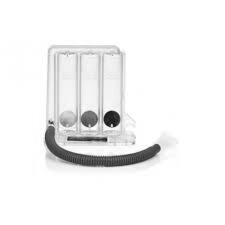Patients recovering from extensive abdominal surgery are often in considerable pain and reluctant to take a deep breath, fearing their stitches might burst. Reduced lung volumes increase the work of breathing and induce venous stasis, leading to potentially fatal consequences.
Incentive spirometers (IS) were a mainstay of post-surgical recovery for many decades, particularly when patient caseloads and drives for early discharge began to take effect in the 1980s (do Nascimento Junior et al, 2014). IS usually came in the form of a cheap, portable, single-use plastic device that was easy for the patient to learn, and could be left with them in the first days after surgery. So IS became a popular technique in early ‘active’ patient management. Once taught, the patient could practice on their own, inhaling into the device and holding weighted balls or other devices in suspension (a motivating incentive) until their lungs enlarged.
IS is somewhat unusual because there is little precedent for a similar device being used in earlier post-operative recovery. Before IS, physiotherapists had to use their hands to help patients re-inflate their lungs. IS made it easier for the therapist to prioritise their work and helped patients on their early road to recovery.
IS are rarely used in high-income countries today because the lack of evidence for its’ efficacy, and the preference for early active mobilisation, have dented the device’s popularity. It remains popular where direct hands-on post-operative physiotherapy services are scarce.
Description provided by David Nicholls of New Zealand.
References
https://hardluckasthma.blogspot.com/2012/09/1970-present-history-of-incentive.html
do Nascimento Junior, P., Módolo, N. S., Andrade, S., Guimarães, M. M., Braz, L. G., & El Dib, R. (2014). Incentive spirometry for prevention of postoperative pulmonary complications in upper abdominal surgery. Cochrane Database Syst Rev, 2), CD006058. https://doi.org/10.1002/14651858.CD006058.pub3

